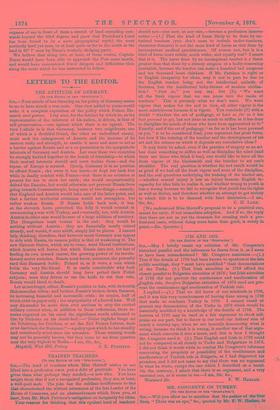LETTERS TO THE EDITOR.
• ■■•11,,■ THE ATTITUDE OF GERMANY.
[TO THE EDITOR OF THR "SPECTATOR,."]
Sis,—Your article of last Saturday on the policy of Germany seems to me to have struck a true note. One view added to yours would make it a complete exposition of the policy which Prince Bis- marck must pursue. I say must, for the instinct by which he, as the representative of the interests of his nation, is driven, is that of self-preservation,—one against which there is no appeal. The view I allude to is that Germany, between two neighbours, one of which is a doubtful friend, the other an undoubted enemy, must seek the enlargement of Austria and the increase of its eastern unity and strength, to enable it more and more to act as a barrier against Russia and as a co-protection to the sympathetic interests of Germany and Austria. Let once these two countries be strongly knitted together in the bonds of friendship—to which their mutual interests should and must incline them—and the repose of Europe is secured. Openly, Germany is in no position to offend Russia ; she owes it too much—it kept her back free while in deadly combat with France—but there is no occasion at present for her to show her cards ; she would unquestionably defend the Danube, but would otherwise not prevent Russia from going towards Constantinople, being sure of two things,—namely, that England and Austria would take care of the latter point, and that a further territorial extension would not strengthen, but rather weaken Russia. If Russia holds back now, it has, at the eleventh hour, perceived the folly it would commit in commencing a war with Turkey, and eventually, too, with Austria. Austria in either case would be sure of a large addition of territory. The Hungarians must concur in the end ; they would be nothing without Austria ; they are financially nearly ruined already, and would, if sent adrift, simply fall to pieces. I cannot help thinking, therefore, that however much Germany may appear to side with Russia, its unseen policy is that of weakening it The new Slavonic States, which are to come, want liberal institutions, which Austria will foster, but which Russia dare not, for fear of feeding its own inward cancer, the growing power of its revolu- tionary secret societies. Russia must know, moreover, the powerful card that Bismarck holds ; Poland is, as it were, a vein which holds the very life-blood. It is easily conceivable why both Germany and Austria should long have petted their Polish subjects ; were they driven to use the knife to cut that vein, Russia would bleed to death.
Let us not forget, either, Russia's position in Asia, with its hostile Mahommedan tribes; and further, Russia's broken-down finances, its increasing financial and mercantile crisis ; its armies, half of which exist on paper only ; the unpopularity of a forced loan. Well may Alexander be more than ever anxious to stop the excited military current when, in addition to these reflections, there re- mains engraved on his mind the significant words addressed to him by Nicholas on his death-bed :—" Deine titgliche Sorge sei die Erhaltung des Friedens, er sei das Ziel Deines Lebens, denn er ist das Gluck der Nationen !"—a policy upon which he has steadily and consistently acted since his accession. These warning words may not be generally known, but they come to me from quarters near the very highest in Berlin.—I am, Sir, &c.,


































 Previous page
Previous page